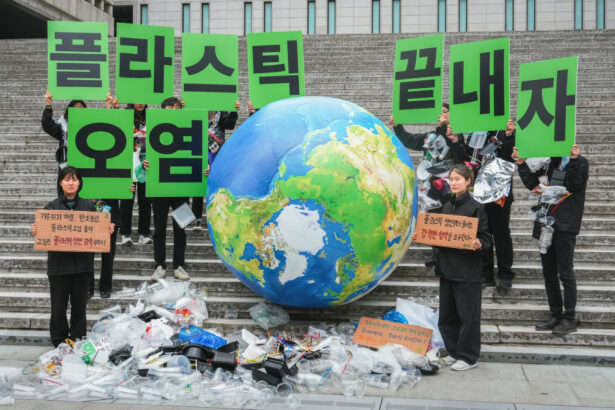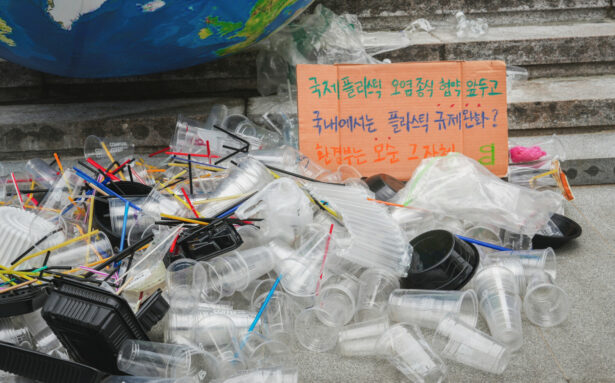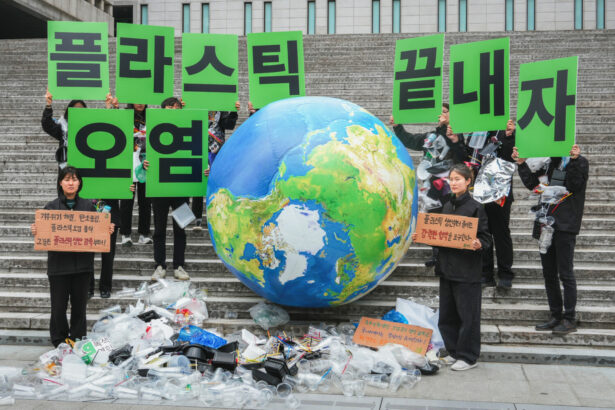
효과적인 국제 플라스틱 협약 위해선 생산 감축 목표 반드시 반영되어야
– 4차 협상, 치열한 논의 끝에 결국 구체적인 진전 없이 마무리
– 5차 회의를 개최하는 한국정부의 강한 의지와 노력 필요
지난 4월 30일, 국제 플라스틱 협약 정부 간 협상위원회 4차 회의(이하 ‘4차 협상’)가 구체적인 진전 없이 마무리 되었다. 1차 플라스틱 폴리머에 대한 논의를 회기 간 작업에 포함하지 않기로 결정한 것이다. 이는 애초에 생산 감축이 필요하다고 합의했던 유엔환경회의(UNEA) 5/14 결의안 방향을 거스르는 결정으로, 강력한 협약 체결에서 더 멀어진 것이다. 기후위기 대응을 위해서는 플라스틱 생산량을 획기적으로 줄여야 한다는 점에 있어 이번 4차 협상 결과는 매우 실망스럽다.
플라스틱은 생애 전 주기에 걸쳐 온실가스가 발생하고, 이는 지구 온도 상승으로 이어진다. 또한 지구 온도가 올라가 태풍이나 홍수 등의 극한기상이 잦아지면 바닷속 플라스틱이 더 잘게 부서지고 멀리 퍼지며 해양생태계를 오염시켜, 둘은 밀접한 상관관계에 있다는 사실이 연구를 통해 밝혀졌다. 국제 플라스틱 협약 목표가 ‘지구 기온 상승폭을 1.5도 이내로 제한하자’는 유엔기후변화협약(UNFCCC) 파리협정 목표와 궤를 같이 해야 하는 이유다.
4차 협상의 결과에 대해 많은 우려가 있지만 일부 진전된 내용도 있다. 페루와 르완다는 2040년까지 전 세계 1차 플라스틱 폴리머 사용량을 2025년 대비 40% 줄이자는 제안을 했으며 이에 말라위, 필리핀, 피지 등이 강력한 지지를 보냈다. 플라스틱 협약 우호국 연합(HAC) 역시 1차 플라스틱 폴리머 소비와 생산을 지속 가능한 수준으로 제한 및 감소해야 한다는 내용을 포함해야 한다는 입장을 발표했다. 5차 협상 전까지 회기 간 작업을 의무화하고 참관인을 참여시키기로 합의한 점도 눈여겨볼 만하다.
이번 4차 협상 중에 부산에서 열릴 5차 협상에 추진력을 더하기 위한 <부산으로 가는 다리(Bridge to Busan)> 선언문이 발표되었다. 선언문은 “플라스틱의 전체 수명주기를 다루는 포괄적인 접근법을 바탕으로 해양 환경을 포함한 플라스틱 오염에 대한 국제적 법적 구속력이 있는 수단을 개발하라는 유엔환경총회(UNEA) 결의안 5/14의 의무를 재확인”하며 “플라스틱의 전체 수명 주기에는 1차 플라스틱 폴리머의 생산이 포함된다”는 점을 강조한다. 그러나 현재까지 32개국이 서명한 이 선언문에 정작 5차 협상 개최국인 한국은 빠져 있어 야심찬 협약 체결에 대한 한국 정부의 의지가 의심된다.
한국 정부는 국제 플라스틱 협약 5차 협상 개최국이다. 플라스틱 협약 우호국 연합(HAC)에 참여하고 있지만 생산 감축과 관련한 공식 입장을 발표하지 않았다. 협상 개최국으로서의 위상을 홍보하면서도 강력한 협약 체결에 대한 책임은 회피하고 있는 것이다.
다가오는 11월, 5차 협상 기간에는 각 국가 대표단을 비롯하여 수천 명의 다양한 이해관계자가 부산에 모인다. 한국 정부는 개최국으로서의 책임감을 갖고 회기 간 작업에서 적극적인 역할을 해야 한다. 그 역할은 지난 2년간 줄줄이 완화시킨 플라스틱 사용 규제를 되돌려놓는 데에서 출발해야 한다. 국내 자원순환정책이 잇달아 후퇴하고 있는 상황에서 국제 협약 협상 과정에서 주요 역할을 자임할 수는 없지 않겠는가. 녹색연합은 국제 사회가 강력한 국제 플라스틱 협약을 체결하길 촉구하며, 그 과정에 한국 정부가 제 역할을 다할 수 있도록 감시와 개입을 계속해 나갈 것이다.
2024년 5월 3일
녹색연합
담당: 녹색사회팀 유새미 | 070-7438-8513 | jazzygreen@greenkorea.org


Global Plastics Treaty Must Include Production Reduction Targets to Be Effective
– INC-4 Concludes Without Concrete Progress Following Intense Discussions
– Strong Commitment Needed from Republic of Korea to Host INC-5
On April 30, the fourth meeting of the Intergovernmental Negotiating Committee on the Global Plastics Treaty (hereafter “INC-4”) concluded without concrete progress. The decision was made not to include a discussion on primary plastic polymers in the intersessional work. This decision reverses the direction of UN Environmental Assembly (UNEA) Resolution 5/14, which originally agreed that production reductions were needed, and moves us further away from a strong agreement. The outcome of the INC-4 is extremely disappointing, given that dramatic reductions in plastic production are necessary to combat the climate crisis.
Plastics produce greenhouse gases throughout their life cycle, which contribute to global warming. Research has also shown that as global temperatures rise and extreme weather events such as typhoons and floods become more frequent, plastic in the ocean breaks down more easily and is dispersed farther, polluting marine ecosystems, and the two are closely linked. This is why the goals of the Global Plastics Treaty should be aligned with the United Nations Framework Convention on Climate Change (UNFCCC) Paris Agreement goal of limiting the increase in global temperature to well below 1.5 degrees Celsius.
While there are many concerns about the outcome of the INC-4, there was some progress. Peru and Rwanda proposed a 40% reduction in global primary plastic polymer use by 2040 compared to 2025, which was strongly supported by Malawi, the Philippines, Fiji, and others. The High Ambition Coalition to End Plastic Pollution (HAC) also announced its position that the text should include a requirement to limit and reduce the consumption and production of primary plastic polymers to sustainable levels. It is also noteworthy that the member states agreed to mandate intersessional work and to involve observers in this process.
During this fourth round of negotiations, the ‘Bridge to Busan’ declaration was released to add momentum to the fifth round of negotiations in Busan. The declaration “reaffirms the mandate of United Nations Environment Assembly (UNEA) Resolution 5/14 to develop an international legally binding instrument on plastic pollution, including in the marine environment, based on a comprehensive approach that addresses the full lifecycle of plastics” and emphasizes that “the full lifecycle of plastics includes the production of primary plastic polymers.” However, the declaration, which has been signed by 32 countries to date, does not include the Republic of Korea, the host of the INC-5, raising questions about the government’s commitment to an ambitious agreement.
The South Korean government, despite being the host of INC-5 and a member of the HAC, has not yet announced an official stance on production reductions. While it promotes its status as host, it appears to be avoiding its responsibility to facilitate a strong agreement.
In November, thousands of stakeholders from diverse backgrounds, including national delegations, will convene in Busan for the fifth round of negotiations. As the host country, the South Korean government must fulfill its responsibilities and actively engage in the intersessional work. It should begin by reversing the relaxation of plastic use restrictions that has occurred over the past two years. We at Green Korea United urge the international community to finalize a robust global plastics treaty. We will continue to monitor and intervene to ensure that the Korean government plays its part in this crucial process.
May 3, 2024
Green Korea United
YU Sammy | +82-70-7438-8513 | jazzygreen@greenkorea.org






